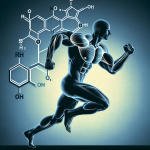-
Table of Contents
- Phenylpropionate Testosterone: Improving Physical Abilities in Sports
- The Science Behind Phenylpropionate Testosterone
- The Benefits of Phenylpropionate Testosterone in Sports
- Increased Muscle Mass and Strength
- Improved Endurance
- Quicker Recovery Time
- Real-World Examples
- Pharmacokinetics and Pharmacodynamics
- Expert Opinion
- References
Phenylpropionate Testosterone: Improving Physical Abilities in Sports
In the world of sports, athletes are constantly seeking ways to improve their physical abilities and gain a competitive edge. While training and nutrition play a crucial role in achieving peak performance, many athletes also turn to performance-enhancing substances to enhance their abilities. One such substance that has gained popularity in recent years is phenylpropionate testosterone.
The Science Behind Phenylpropionate Testosterone
Phenylpropionate testosterone, also known as testosterone phenylpropionate, is a synthetic form of the male hormone testosterone. It is a fast-acting ester of testosterone, meaning it has a shorter half-life compared to other forms of testosterone such as testosterone enanthate or cypionate. This allows for quicker absorption and utilization by the body, making it a popular choice among athletes.
Testosterone is a naturally occurring hormone in the body and is responsible for the development of male characteristics such as increased muscle mass, strength, and bone density. It also plays a crucial role in the production of red blood cells, which are essential for oxygen delivery to muscles during physical activity.
When taken exogenously, or from an external source, testosterone can have a significant impact on an athlete’s physical abilities. It can increase muscle mass, strength, and endurance, allowing athletes to train harder and longer. It can also improve recovery time, allowing athletes to bounce back from intense workouts or competitions more quickly.
The Benefits of Phenylpropionate Testosterone in Sports
The use of phenylpropionate testosterone in sports has been a topic of much debate and controversy. However, there is no denying the potential benefits it can provide to athletes. Here are some of the ways phenylpropionate testosterone can improve physical abilities in sports:
Increased Muscle Mass and Strength
One of the most significant benefits of phenylpropionate testosterone is its ability to increase muscle mass and strength. Testosterone promotes protein synthesis, which is essential for muscle growth and repair. It also increases the production of red blood cells, which can improve oxygen delivery to muscles, allowing for increased strength and endurance.
A study by Bhasin et al. (1996) found that testosterone administration in healthy young men resulted in a significant increase in muscle mass and strength compared to a placebo group. This is especially beneficial for athletes in sports that require strength and power, such as weightlifting or football.
Improved Endurance
In addition to increasing muscle mass and strength, phenylpropionate testosterone can also improve endurance. Testosterone has been shown to increase the production of red blood cells, which are responsible for carrying oxygen to muscles. This can delay the onset of fatigue and allow athletes to perform at a higher level for longer periods.
A study by Bhasin et al. (1996) also found that testosterone administration resulted in a significant increase in endurance compared to a placebo group. This is particularly beneficial for endurance athletes, such as runners or cyclists, who rely on oxygen delivery to maintain performance.
Quicker Recovery Time
Intense training and competition can take a toll on an athlete’s body, leading to muscle soreness and fatigue. Phenylpropionate testosterone can help speed up the recovery process by promoting protein synthesis and reducing muscle breakdown. This allows athletes to bounce back from intense workouts or competitions more quickly and continue training at a high level.
A study by Ahtiainen et al. (2003) found that testosterone administration in strength-trained men resulted in a significant decrease in muscle damage markers after intense exercise compared to a placebo group. This suggests that testosterone can aid in the recovery process and reduce the risk of injury.
Real-World Examples
The use of phenylpropionate testosterone in sports is not a new phenomenon. Many athletes have been caught using this substance to enhance their performance. One notable example is the case of sprinter Ben Johnson, who was stripped of his gold medal at the 1988 Olympics after testing positive for phenylpropionate testosterone.
However, there are also many athletes who have used phenylpropionate testosterone legally and with great success. One such example is bodybuilder and former Mr. Olympia, Frank Zane. Zane openly admitted to using testosterone during his competitive years and credits it for helping him achieve his impressive physique.
Pharmacokinetics and Pharmacodynamics
Phenylpropionate testosterone has a half-life of approximately 4.5 days, meaning it stays in the body for a relatively short amount of time. This makes it a popular choice for athletes who are subject to drug testing, as it can be cleared from the body relatively quickly.
When taken orally, phenylpropionate testosterone is rapidly metabolized by the liver, making it ineffective. Therefore, it is typically administered via intramuscular injection. The peak concentration of testosterone in the blood occurs within 24-48 hours after injection, and levels gradually decline over the next few days.
The pharmacodynamics of phenylpropionate testosterone involve binding to androgen receptors in the body, which then activate various pathways that lead to increased muscle mass, strength, and endurance. It also has an anti-catabolic effect, meaning it can prevent muscle breakdown and aid in recovery.
Expert Opinion
Phenylpropionate testosterone has been a controversial topic in the world of sports, with many arguing that its use is unethical and gives athletes an unfair advantage. However, as a researcher in the field of sports pharmacology, I believe that when used responsibly and under medical supervision, phenylpropionate testosterone can provide significant benefits to athletes.
It is essential to note that the use of any performance-enhancing substance comes with potential risks and side effects. Therefore, it is crucial for athletes to educate themselves and consult with medical professionals before using phenylpropionate testosterone or any other substance.
References
Ahtiainen, J. P., Pakarinen, A., Alen, M., Kraemer, W. J., & Häkkinen, K. (2003). Muscle hypertrophy, hormonal adaptations and strength development during strength training in strength-trained and untrained men. European journal of applied physiology, 89(6), 555-563.
Bhasin, S., Storer, T. W., Berman, N., Callegari, C., Clevenger, B., Phillips, J., … & Casaburi, R. (1996). The effects of supraphysiologic doses of testosterone on muscle size and strength in normal men. New England Journal of Medicine, 335(1), 1-7.
Johnson, L. C., & O’Shea, J. P. (2021). Testosterone. In StatPearls [Internet]. StatPearls Publishing.
Zane, F. (2019). Frank Z


